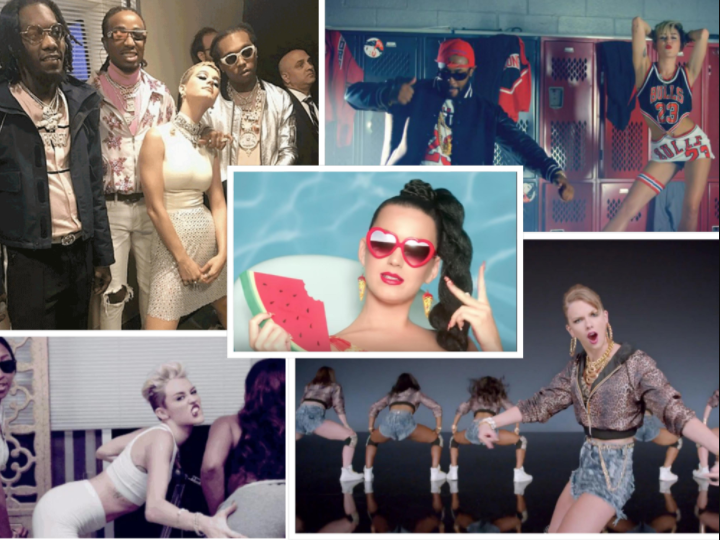By: Zoe Hines Founder of Ballistic Sounds. I’m only going to say this once: stop appropriating hip-hop culture for mainstream success. It’s not funny, it’s not cool, it’s annoying. Most people reading the first sentence of this article might say:
“How is hip-hop even being... like... appropriated?” Well, why don’t we start with a recent artist that has repeatedly used cringeworthy mannerisms in pictures and performances. Yup, you guessed it: Katy Perry. She has released tracks with ubiquitous names in hip-hop such as Migos and Nicki Minaj. There is nothing wrong with collaborating and fusing different music genres to appeal to a larger audience. It has always been a norm in the music industry, but when pop artists start acting a certain way to seem “down,” controversy erupts. Listen Katy, you don’t have to pose like you “bout it” with Migos to gain hype from a predominantly black audience. You have actually turned them off and begun digging a grave for your career. Nowadays, an artist’s image is just as vital as the music being distributed. When you dropped “California Gurls” with Snoop Dogg in 2010, you remained authentic and your success showed, so why change now? And the answer to that question is $$$. The music industry continues to be meticulous with rising trends, particularly hip-hop’s popularity in mainstream society. Nielsen Music’s 2016 U.S. Year End Report revealed that hip-hop is the most audio-streamed genre. So what does the industry do when a music genre has become auspicious? They adjust to the changes. Another prime example is Miley Cyrus. Before Cyrus was twerking and spitting elementary bars, she was recording pop songs for a younger audience. Cyrus’s demographic and sound changed when she debuted Bangerz in 2013. It featured rappers like Future, Nelly, Big Sean and French Montana. A majority of the tracks were produced by Mike Will Made It. Again, nothing wrong with working with these artists, but where do we draw the line between genuine appreciation of the culture and culture appropriation? In the case of Cyrus, this line has become very clear. She described her interest in Kendrick Lamar’s song “humble” due to its written content in a Billboard interview stating, “I love that because it’s not ‘Come sit on my dick, suck on my cock.’ I can’t listen to that anymore. That’s what pushed me out of the hip-hop scene a little. It was too much ‘Lamborghini, got my Rolex, got a girl on my cock’ -- I am so not that.” Wait, pause Miley. How are you really going to say all of this when you yourself were apart of this scene you all of a sudden have disdain for? Did you forget about your verse on Mike Will Made It’s track “23” or your style choices specifically during the promotion of Bangerz? Complex Magazine released a timeline of Miley Cyrus appropriating hip-hop culture proving her statements are some bullshit. In all honesty, when she says “I am so not that” I believe Cyrus because the image that she fronted for Bangerz was a marketing scheme. It was an attention-seeking decision deemed unpalatable by most observers. Regardless if the reactions were negative or positive, people responded by listening to the album due to curiosity. Katy Perry and Miley Cyrus didn't decide out of the blue to jump into hip-hop because they enjoy the music category. Both artists are signed with major labels that dominate the industry. Universal Music Group and Sony Music Entertainment combined controls over half of the market according to The Nielsen Company & Billboard’s 2011 Music Industry Report. These powerhouse labels are able to utilize their resources to gain eminence and prosperity while using ignorant approaches to attract a broader audience. Perry and Cyrus aren’t the only artists guilty of using this strategy. Taylor Swift is responsible for the same offenses in her video for “Shake It Off,” which capitalizes on black stereotypes. The industry saw where the flow of money was going and worked with these artists to fabricate an identity for more views; the articles written about their odious behavior give them free press. As we complain and express our opinions, we give these artists the scrutiny that they don’t deserve. As we discuss this ongoing issue of image in the music industry remember this: history repeats itself and there will be another artist who will do the same thing sooner or later. As an audience, we need to hold the industry accountable and elucidate the difference between admiration for a culture and selling stereotypes of a culture for revenue.
2 Comments
Demetrius McCray
6/7/2017 10:22:03 am
This is true LIFE!
Reply
Corey Smith
6/12/2017 12:20:16 pm
I agree. The appropriation of black culture when it's for monetary gains and then the distancing/disrespect for that same culture when it's no longer profitable or controversial, is something that has been going on since Elvis. At least now, we can see it happening and bring awareness to it, like you have!
Reply
Leave a Reply. |


 RSS Feed
RSS Feed